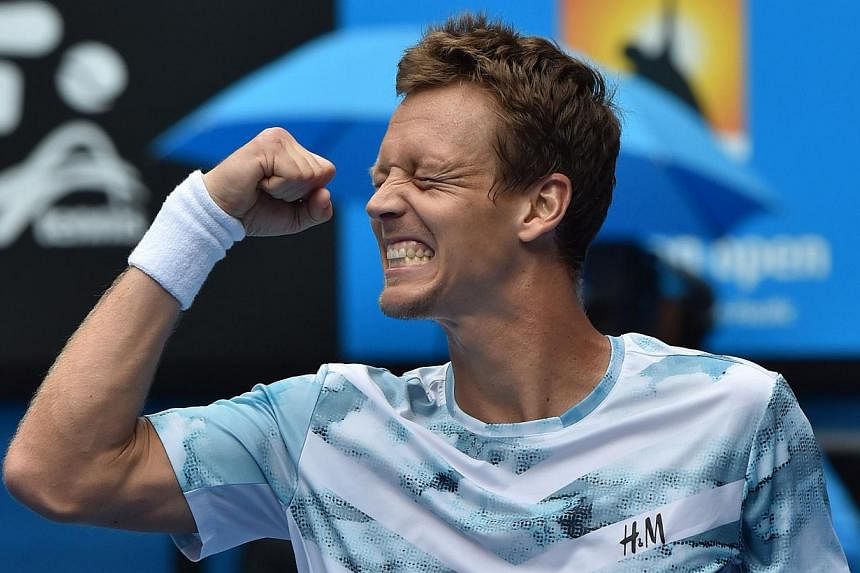"Whoever is winning at the moment will always seem to be invincible." George Orwell wrote this on power and politics, yet it is equally applicable to sport. But nothing lasts forever, not those conquerors of geography nor those who make history on court.
Eventually, a man ages like Roger Federer or his body rebels like Rafael Nadal. In the locker room, awe turns to opportunity and apprehension to possibility. Vulnerability is like blood in the water and for athletes it is the most beautiful of scents.
Yesterday, Tomas Berdych, serving and striking forehands as if he were in possession of David's slingshot, eviscerated Nadal 6-2, 6-0, 7-6 (7-5) in the quarter-finals. The Spaniard had no evident "feeling" nor "intensity", yet the Czech seemed to carry no conspicuous fear.
Surprise reigned yesterday but no shock reverberated. Nadal is recovering from injury - "When you have injuries, are difficult the comebacks" - and yesterday seemed afflicted by a rumoured ailment he refused to reveal. He wins without gloating and loses absent of excuse. "Just was not my day. I just can congratulate my opponent."
With exceptional athletes whose fortitude and limits lie beyond our comprehension, we must tread cautiously on the delicate matter of changing guards. The Big Four, after all, are only slightly rearranged, with Djokovic No. 1, Federer No. 2, Nadal No. 3 and Murray No. 6.
But numbers are bland, they do not speak of aura, that precious quality - just ask Lionel Messi - which gently evaporates. It is not that winning is behind these men, for Djokovic is displaying his classic control here and Murray is rebooted and rejuvenated; it is that winning is no longer automatic.
Twelve months ago, in this Melbourne precinct, Stan Wawrinka, who had lost his last 14 meetings to Djokovic and was 0-12 to Nadal, defeated them both. Nine months later, Federer, undefeated in five matches against Marin Cilic, fell to him at the US Open. Three months later, 10-0 against Andreas Seppi, Federer folded against the Italian at this Open. Four days later, Nadal, who had defeated Berdych 17 successive times and was on the cusp of a record, could not even win a set.
The numbers are not conclusive, but they are clues to an emerging uprising. A century from now if they are trying to excavate when a generation faltered they might start sifting the sands of this time. In the 38 Grand Slam events since the 2005 Australian Open, one of the Big Four appeared in every final. Except for the US Open last year, when two chaps named Kei and Marin decided to put on their own show.
For convenience we slotted the Big Four together, yet it is too glib a fit. Federer is 33 and Djokovic was 16 when the Swiss first won Wimbledon in 2003. Nadal won his first Slam in 2005, but Murray only in 2012. Each one battles separate demons and now must also contend with Nishikori, Milos Raonic and Grigor Dimitrov. It is not just younger men but reinvented athletes, for Wawrinka is older than Nadal and so is Berdych. There was once a knocking on their collective door, now splinters are flying everywhere with the pounding.
Federer will struggle to win another major title; Nadal will prevail, even if he has not grabbed the Australian since 2009 nor Wimbledon since 2010. Both men are in different places but stay in our minds as a duet, though only strains of their melody remain.
From the 2005 French Open to the 2010 US Open, only once was a Grand Slam final played without a Federer hair flick or Nadal tug of the shorts. Yet in the last nine Grand Slam finals, four times has neither been represented. The unyielding two are now the vincible two. Once they won Slams as if it was their divine right, now they sneak them away. From 2005 to 2010, they won 21 of the 24 Grand Slam titles; since then, only six of 16.
In Wimbledon 2013, they were both rudely sent home by the second round and now already both have left the premises. In Australia an Open continues, in Europe two legends sit idle among their 31 Grand Slam trophies.
Change in sport is a paradox: We demand it yet flinch from it. We want the new yet struggle to let go of the old. As much as we know champions fade, the truth of their mortality is almost a surprise. The image of Nadal explaining his defeat was poignant but so is the image of an Asian shouldering his way unapologetically into the limelight. In sport, something lost is always something gained.
Nadal, too real a man for fantasies, replied swiftly when asked "if" things might have changed "if" he won the third set. In a quote built for Twitter, he said: "The 'if' doesn't exist in sport." There is no "if" either to change in tennis. We cannot set a precise date, but the rebellion has begun.

